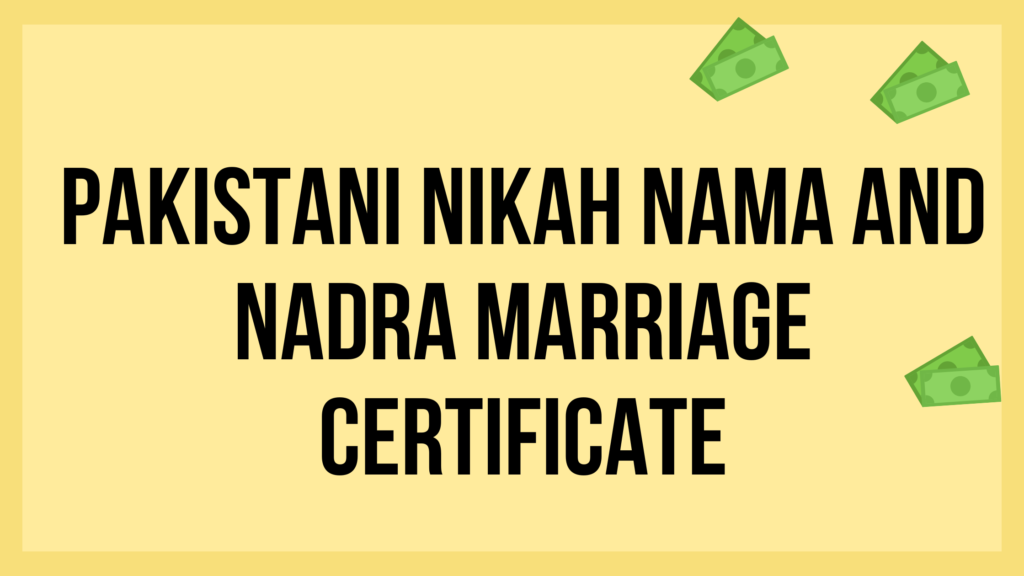Nikah and Nikah Nama | Pakistani Nikah Nama | NAdra-marriage-certificate
Pakistani Nikah Nama and NADRA Marriage Certificate
What is Nikah?
Muslim marriage is called Nikah in Arabic, and it is mentioned in the Holy Quran. Marriage is considered to be a Nikah in the Islamic tradition, and no specific rituals are required. Despite religious and social restrictions, Muslim marriage is a contract that follows the following requirements:
- The procedure involves a declaration of marriage (aijab) by one party and its acceptance (qabool) by the other party, with both parties being able to marry and expressing their acceptance at the same time, both parties having the capacity to marry. Either party may make an offer, and either party may accept the offer.
- The free and full consent of both parties to the marriage must be obtained (a guardian can marry a minor without invalidating the marriage, but he or she is still responsible under the Child Marriage Restraint Act 1929 (CMRA))
- As a requirement to prove the authenticity of the statement, two adult, sane Muslims must witness the statement (a man and two women).

Offering and Accepting the Nikah Marriage Contract
It is essential that the Nikah be performed in one sitting in order to avoid any complications. Nevertheless, this can also be done through the use of a representative (vakeel) in order to offer and accept the Nikah, making it possible for both parties to be physically present at the ceremony. It is possible for either party to perform the Nikah over the phone or via Skype if neither party is physically present at the actual ceremony itself. For example, the Nikah can be performed over the phone or via Skype (Online Nikah). There is a common practice where representatives from both sides meet and discuss matters in one place, and then the representative from the other side is contacted over the phone or via Skype to coordinate things with the other party’s representative, if he or she is not present. The representative fulfills the offer and acceptance responsibilities of the actual party in front of witnesses. A marriage of this type is recognized by the Pakistani government. Many countries do not recognize such a marriage, which is often referred to as a proxy marriage, regardless of whether it is recognized under the law of the country in which it was initiated or not, regardless of whether it is recognized under the law of the country in which it was solemnized.
Minimum Age for Marriage/Nikah:
A federal Shariat Court (FSC) ruling was issued in October 2021 pertaining to the Child Marriage Restrictions Act (CMRA) 1929, which stipulates that the minimum age requirements for a girl’s marriage should be 16 years old, and the minimum age requirements for a boy’s marriage should be 18 years old. In addition to age, there are other factors that are also important to keep in mind:
- Gender: There should be two people in the group, one of whom should be male, and the other one should be female.
- Mental Capacity: Both parties involved must be in a mental state of good health and not suffering from any mental impairment.
Religion: There must be at least one Muslim in both parties, or one of them may be a Muslim male and the other one may be an Ahlul-Kitab or Kitabia woman (follower of a revealed religion). Generally, in Pakistani law, a Muslim woman cannot marry a non-Muslim man (even if it is a kitabi man) if the relationship is legally recognized by Islamic law, as it is against Muslim rules.
Consent For the Nikah/Marriage:
For a contract to be legally binding, all formalities and conditions must be agreed upon by both parties freely and voluntarily in order for it to be legally binding. It is essential to give a clear consent, without any ambiguities. In order to accept something, one must express it openly and consciously without being intimidated or forced. Marriage is invalid if it is entered into without consent or if it is acquired through force, fraud, coercion, or misrepresentation.
If a woman is forced to marry against her will, there will be a criminal penalty for that act, since the offenders will be prosecuted for their crimes in court. The Family Court can declare a marriage null and void even if the woman obtained a decree declaring the marriage null and void, even though it was a lawful marriage.
A decree like this is known as a jactitation of marriage. It is possible to include the registrar in the proceedings if the forced marriage falls within the scope of the offence of forced marriage as defined in the Penal Code so that the registrar becomes a party to the proceedings. It is unlikely that this will happen in the absence of that.
During the course of the proceedings, a question will be raised regarding the validity of the marriage. However, in addition to what has been stated, if the marriage was not a forced marriage as defined by the Penal Code and the bride complained about a particular condition but did not express her concerns during the wedding ceremony, then the registrar is not liable.
Witnesses Should Sign on the Nikah Nama
When the registrar is appointing the vakeel for the nikah, he or she should make sure that the witnesses who are appointing the vakeel for the nikah are not the same witnesses who are appointing the wedding vakeel. It hasn’t happened in any of our cases so far as we are aware, and as far as we know this has never happened. As far as we know, we have not heard of any cases in which this problem has been encountered. This is something that would be handled administratively at the UC level, according to my understanding.
Dower (Meher) should be Mentioned on Nikah Nama Form
Dower is an essential component of a Muslim marriage that must be fulfilled for it to be considered valid. It is a sum of money that is paid to the wife by the husband at the time of negotiating the marriage contract between them. In the course of this process, it is commonly referred to as the “consideration of marriage” process. It is a mandatory It is required that there be a requirement in Pakistan to fix this amount at the time of marriage, and that the applicable law there specifies that the fix has to occur at the time of marriage. In spite of the fact that it is not mentioned in the Nikah Nama at the time of the marriage and no special amount of money or any other property is specifically mentioned, regardless of the fact that a marriage contract exists, the woman’s right to claim dower is not affected.
Registration of Marriage
According to section 5 of the Muslim Family Law Ordinance 1961, it is a legal requirement that all marriages which are conducted in accordance with the Islamic Law must be registered. It is important to note that every Union Council appoints a Nikah Registrar in its area for the purpose of registering Nikahs, and this Nikah Registrar is then granted a license by the Union Council for the purpose of registering Nikahs in the Union Council’s area. It is the responsibility of the Registrar to either receive a seal from the Union Council or to obtain permission from the Union Council to use one that bears both his license number and the number of the Union Council in order to authenticate his identity. Generally, there is no time limit when it comes to registering a marriage, although it is always advisable to register it as soon as possible after it has taken place.
Recent Posts
Have Any Question?
- (+62)81 157 5891
- support@domain.com
